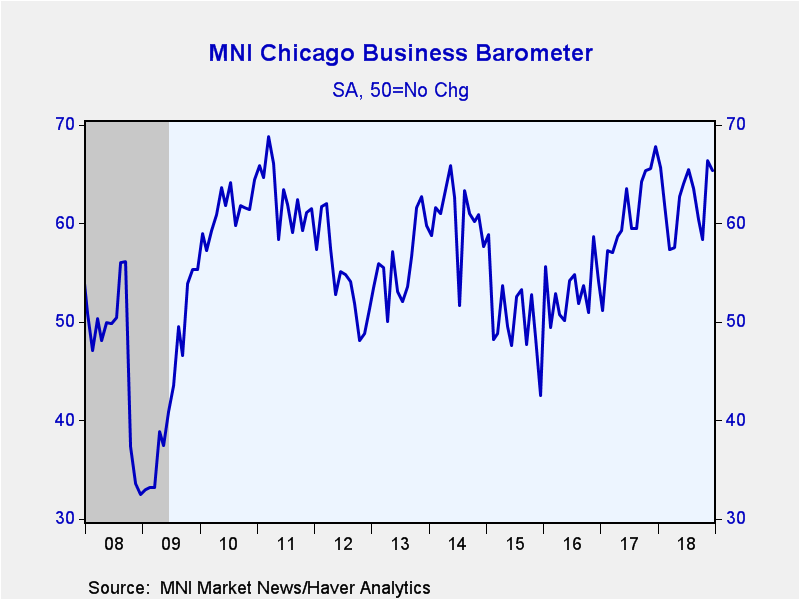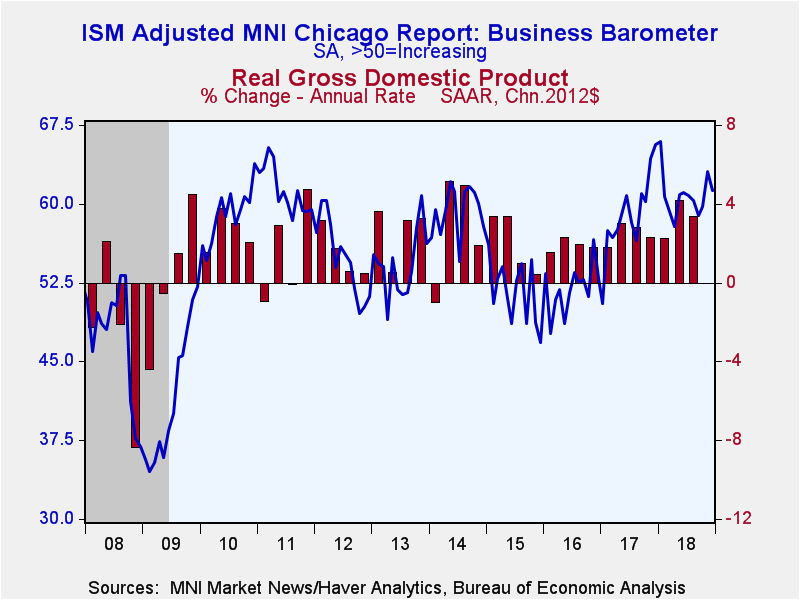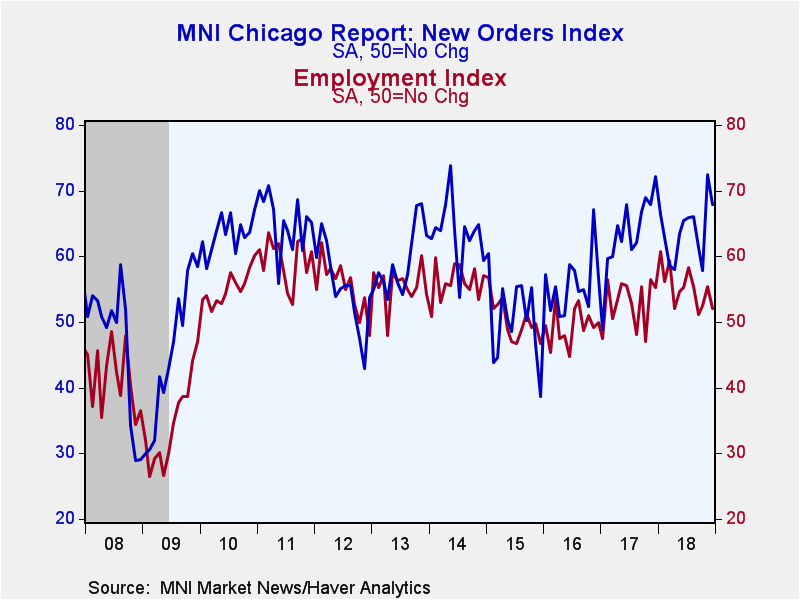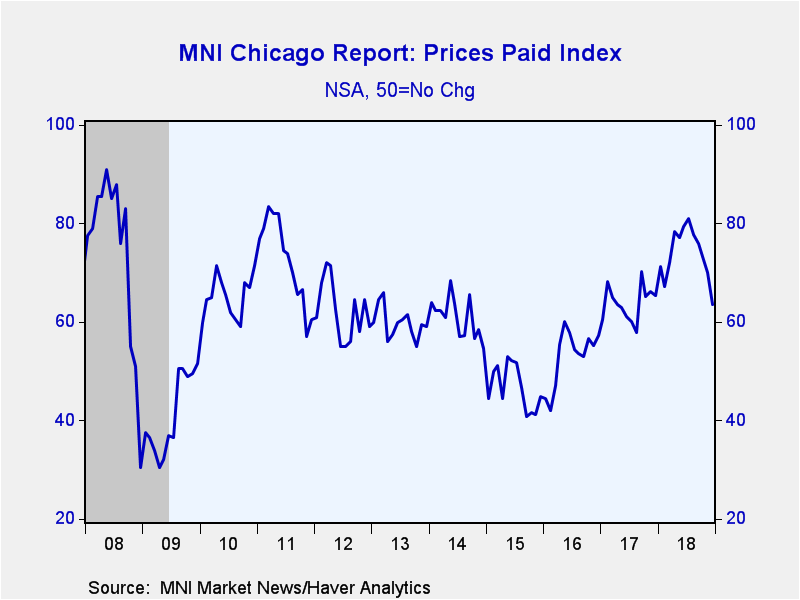 Global| Dec 28 2018
Global| Dec 28 2018U.S. Chicago Business Barometer Remains Robust
Summary
The Chicago Purchasing Managers Business Barometer remained at an elevated level of 65.4 in December after surging to 66.4 in November. Chicago Business Survey readings in the mid-60s are unusual and reflect a strong business climate. [...]
The Chicago Purchasing Managers Business Barometer remained at an elevated level of 65.4 in December after surging to 66.4 in November. Chicago Business Survey readings in the mid-60s are unusual and reflect a strong business climate. The Action Economics Forecast Survey expected a reading of 62.2. The Chicago Purchasing Managers figures are diffusion indexes where readings above 50 indicate growth.
Haver Analytics constructs an ISM-Adjusted Chicago Business Barometer with similar methodology as the ISM Composite Index. This index slipped to 61.3, but remained at a healthy level. The Chicago index has a 75% correlation with the national ISM Manufacturing Index, which is scheduled for release Thursday, January 3.
A surge in the production component of the Chicago index offset lost ground (from high levels) in delivery times. Last month, the supplier deliveries index had surged, suggesting the slowest delivery times in over a decade. Today's reading erased that positive signal. In addition, the order backlog and inventory readings rose, while new orders declined.
The employment index declined in December to 52.1. While the employment diffusion index can be volatile and often bears no correlation with the employment report, the details of the report were worrisome. The proportion of survey respondents that indicated employment was higher in the month fell by 15 percentage points to 13 percent. That was the lowest figure in two years and the largest month-to-month decline since 2014.
The index of prices paid weakened for the fifth consecutive month. The NSA reading of 63.5 was the lowest since August 2017 and down from July's 81.0. A greatly reduced 33% of respondents reported higher prices, while a slightly increased 6% reported lower prices. The percentage figures are NSA.
The MNI Chicago Report is produced by MNI in partnership with ISM-Chicago. The survey covers a sample of over 200 purchasing professionals in the Chicago area with a monthly response rate of about 50%. Summary data are contained in Haver's USECON database, with detail including the ISM-style index in the SURVEYS database. The Action Economics Forecast Survey is available in AS1REPNA.
| Chicago Purchasing Managers Index (%, SA) | Dec | Nov | Oct | Dec '17 | 2017 | 2016 | 2015 |
|---|---|---|---|---|---|---|---|
| General Business Barometer | 65.4 | 66.4 | 58.4 | 67.8 | 60.8 | 53.1 | 50.3 |
| ISM-Adjusted General Business Barometer | 61.3 | 63.1 | 59.7 | 65.6 | 59.0 | 52.0 | 51.6 |
| Production | 71.0 | 65.2 | 59.8 | 76.9 | 64.3 | 54.7 | 52.5 |
| New Orders | 67.9 | 72.5 | 57.9 | 72.2 | 63.5 | 55.7 | 50.4 |
| Order Backlogs | 64.6 | 62.9 | 51.2 | 59.6 | 55.2 | 47.2 | 44.4 |
| Inventories | 55.4 | 53.7 | 60.2 | 63.9 | 54.9 | 47.2 | 52.1 |
| Employment | 52.1 | 55.4 | 52.5 | 55.3 | 52.9 | 49.4 | 50.3 |
| Supplier Deliveries | 59.9 | 68.7 | 68.3 | 59.6 | 59.4 | 52.8 | 52.6 |
| Prices Paid | 65.6 | 73.2 | 75.1 | 67.2 | 64.0 | 53.2 | 46.8 |
Peter D'Antonio
AuthorMore in Author Profile »Peter started working for Haver Analytics in 2016. He worked for nearly 30 years as an Economist on Wall Street, most recently as the Head of US Economic Forecasting at Citigroup, where he advised the trading and sales businesses in the Capital Markets. He built an extensive Excel system, which he used to forecast all major high-frequency statistics and a longer-term macroeconomic outlook. Peter also advised key clients, including hedge funds, pension funds, asset managers, Fortune 500 corporations, governments, and central banks, on US economic developments and markets. He wrote over 1,000 articles for Citigroup publications. In recent years, Peter shifted his career focus to teaching. He teaches Economics and Business at the Molloy College School of Business in Rockville Centre, NY. He developed Molloy’s Economics Major and Minor and created many of the courses. Peter has written numerous peer-reviewed journal articles that focus on the accuracy and interpretation of economic data. He has also taught at the NYU Stern School of Business. Peter was awarded the New York Forecasters Club Forecast Prize for most accurate economic forecast in 2007, 2018, and 2020. Peter D’Antonio earned his BA in Economics from Princeton University and his MA and PhD from the University of Pennsylvania, where he specialized in Macroeconomics and Finance.
More Economy in Brief
 Global| Feb 05 2026
Global| Feb 05 2026Charts of the Week: Balanced Policy, Resilient Data and AI Narratives
by:Andrew Cates










